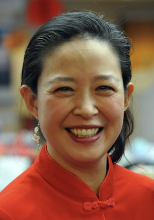
Kizuna Means Community
Frances Kai-Hwa Wang2019, the call went out for 10,000 tsuru or paper origami cranes.
Diagonal fold, unfold, turn, diagonal fold, unfold, flip.
Cranes live for one thousand years. Folding one thousand paper cranes, one for each year of its life, grants one wish. Senbazuru.
We folded a thousand paper cranes for Uncle Ray’s 60th birthday and hung them in long strands from the ceiling to wish him a long life. We folded a thousand golden cranes for Mika’s friend’s wedding to wish the couple a long happy marriage. We also folded cranes in Chinese and Taiwanese language school.
Twelve year old Sadako Sasaki of Hiroshima folded a thousand cranes with a wish to be cured of leukemia, caused by the Americans’ atomic bomb dropped on her city when she was 2. When she was not cured, she folded 300 more. Children today fold and send thousands of cranes to Hiroshima each year. You can see her statue holding a golden crane at the Hiroshima Peace Memorial Museum and in Seattle too.
Horizontal fold, unfold, turn, horizontal fold, unfold, diamond fold.
In 2019, families were detained at America’s southern border and children were being separated from their parents. The Japanese American community stood up and said “Never Again is Now.”
Tsuru for Solidarity called for 10,000 tsuru or origami paper cranes and received 25,000 from around the country and around the world.
Japanese American organizations and Buddhist temples across the country organized tsuru paper crane folding parties. People folded tsuru at home with their children and grandchildren out of historic photographs and wrote messages of hope inside. A bride, happily married now for 40 years, donated the thousand golden cranes she had received as a wedding gift. Here in Michigan, folks at Washtenaw Community College, Ann Arbor District Library, Ann Arbor Art Center, Detroit Historical Museum folded too. A box of tsuru was hand carried from Hiroshima.
Squash fold, squash fold, flip, repeat.
These delicate paper birds carry heavy wishes on their wings for peace, nonviolence, and hope, connecting
∙ the incarceration of 120,000 Japanese Americans in concentration camps during World War 2 (2/3 of whom were U.S. citizens);
Wang, Frances Kai-Hwa, “Kizuna Means Community”
∙ the atomic bombing of Hiroshima and Nagasaki (110,000 to 210,000 dead and 650,000 hibakusha sick with radiation poisoning);
∙ all the immigrants and refugees from around the world seeking a life free of war and poverty; and
∙ the beauty and power of culture, heritage, art and community action.
Taiko drums pounded — don doro don don — as 25,000 tsuru flew to Crystal City Family Internment Camp in Texas, where 4,000 people of Japanese, German, and Italian descent were incarcerated during WWII. Then they flew to the South Texas Family Residential Center in Dilley. 25,000 tsuru circled the fence and taiko drums called out to the people inside — ka ka kara kara don — so that they would know that people outside were standing up for them, speaking out and fighting for them.
“We intend to be the allies that we needed then.”
Now with the lifting of Title 42 and COVID-19 pandemic restrictions at the border, many desperate families are once again heading for the safety and dream of America who sings, “Give me your tired your poor.” Like our elders, they will risk anything for their children. Tsuru for Solidarity calls on all of us to remember and to act. This is not ancient history. “Never again is now.”
Don doron don don ka ka kara kara don.
It’s Asian American Native Hawaiian Pacific Islander Heritage Month and I am struggling with work, struggling with family, struggling with hope.
I come out from my COVID cocoon and go down to the library to hear an elder talk about her experiences in Rohwer concentration camp in Arkansas, her strategies for handling racists and bullies at Ford, and how she continues to stand up and fight well into her 90s. And courage comes.
I think of my grandfather, a famous four-star general in Chiang Kai-Shek’s Air Force who flew the last plane out of China in 1949. After the war, he opened a small sandwich shop in Niagra Falls saying, “I just want peace.”
Pull out the long neck, pull out the tail, press the head, open the wings.
Puff of air.